As the legality and availability of hemp and non-hemp cannabis products continues to grow, having strong, recognizable brands will become increasingly important in order to stand out from the competition. Unfortunately, strong brands invite knock-offs and can require aggressive policing. Registering your trademarks makes policing much easier, but registration of marks used to sell hemp and non-hemp cannabis products requires strategy and forethought.
Why Register?
Trademark rights flow from use, so a registration is not required for enforcement. However, “common law” rights based on use alone must be proven in each instance, and you must show that your use of the mark has been sufficient such that consumers recognize and associate it with your goods or services. This can be difficult, expensive and time consuming. Also, common law rights are territorially limited. Even if you can prove such rights in Oregon (for example), you may have no right to prevent use of your mark in other states. State trademark registrations are similarly limited, but are presently all that is available for marks used exclusively to sell non-hemp cannabis products.
By contrast, a federal trademark registration provides the registrant a nationwide, exclusive and presumed right to use the mark in association with the designated goods and services. In addition, counterfeit use of a federally registered trademark can lead to statutory damages. That is, you don’t have to prove an amount of harm—a court may simply award damages based on statute. Yet another benefit is the ability to file based on an “intent to use.” You can thereby reserve a mark nationwide for up to three years before you must show use. Federal registration is available for marks used to sell hemp products, but with some strict limitations as discussed below.
Use in Commerce Requirement
 Federal registrations are issued by the United States Patent and Trademark Office (the Office) once an application is approved and use in commerce is demonstrated. To satisfy the “use in commerce” requirement, an applicant must show that a mark is being used in association with the sale of goods or services that are legal to trade under federal law. Sale of products not legal under federal law simply does not count to establish trademark use for purposes of federal registration. This is where the vast majority of federal trademark applications for use with cannabis products get rejected. A search of the federal registry shows that, of over 8000 trademark applications for products containing cannabis extracts, only about 1,300 have resulted in registrations. But these 1,300 illustrate that there is a path to success.
Federal registrations are issued by the United States Patent and Trademark Office (the Office) once an application is approved and use in commerce is demonstrated. To satisfy the “use in commerce” requirement, an applicant must show that a mark is being used in association with the sale of goods or services that are legal to trade under federal law. Sale of products not legal under federal law simply does not count to establish trademark use for purposes of federal registration. This is where the vast majority of federal trademark applications for use with cannabis products get rejected. A search of the federal registry shows that, of over 8000 trademark applications for products containing cannabis extracts, only about 1,300 have resulted in registrations. But these 1,300 illustrate that there is a path to success.
Allowable Goods
The Office traditionally rejected all applications for use with products containing any cannabis extracts under the Controlled Substances Act (CSA). The Agricultural Improvement Act of 2018, commonly known as the Farm Bill, created an exception to the CSA for hemp, defined therein as cannabis extracts containing < 0.3% THC by dry weight. Based on this, the Office began allowing applications provided they designate only goods having 0.3% THC content or less. But even that limitation isn’t sufficient for some types of goods.
 Unless specifically disclaimed, the Office will assume the presence of CBD in products containing cannabis extracts, regardless of THC quantity. On that basis it will reject applications for hemp products that are ingestible (food, drinks, nutritional supplements, etc.), or that claim a medical or therapeutic purpose, under the Food, Drug & Cosmetic Act (FDCA). The FDCA requires Federal Drug Administration (FDA) endorsement to add “drugs” to such products, the FDA classifies CBD as a “drug,” and the FDA has authorized only a few products that include CBD. Thus, an allowable good that is ingestible or therapeutic must not only contain the low THC disclaimer, but must also state an absence of CBD. Notably, the Office has not been rejecting products on the basis that they contain CBG (cannabigerol) or other naturally occurring non-THC, non-drug cannabinoids.
Unless specifically disclaimed, the Office will assume the presence of CBD in products containing cannabis extracts, regardless of THC quantity. On that basis it will reject applications for hemp products that are ingestible (food, drinks, nutritional supplements, etc.), or that claim a medical or therapeutic purpose, under the Food, Drug & Cosmetic Act (FDCA). The FDCA requires Federal Drug Administration (FDA) endorsement to add “drugs” to such products, the FDA classifies CBD as a “drug,” and the FDA has authorized only a few products that include CBD. Thus, an allowable good that is ingestible or therapeutic must not only contain the low THC disclaimer, but must also state an absence of CBD. Notably, the Office has not been rejecting products on the basis that they contain CBG (cannabigerol) or other naturally occurring non-THC, non-drug cannabinoids.
Are the Goods Sold Really Allowable?
Of course this scheme of word-smithing designations to obtain allowance of federal trademark registrations invites error, if not fraud. Registrations are subject to cancellation if use of the mark with the designated goods is not maintained, or if it can be shown that the registration was fraudulently obtained. Thus, critical to a claim of use is that the applicant offers products that actually meet the designation description. The Office does not check for THC levels or CBD presence, and most purveyors of hemp products don’t either. Indeed, there is not even a standardized method for measuring these things. However, studies show that more than half of hemp products either purposefully or accidentally misrepresent their actual THC and CBD levels.i Though legally untested, this presents a potential problem for many existing federal registrations.
If a mark registered for use with goods having < 0.3% THC is found to be used only with products that actually have a greater amount of THC in them, the registration could be canceled. The same fate could befall a registration for goods claiming to have no CBD that, when tested, actually do contain more than trace levels. Even if non-hemp cannabis products are legalized under federal level, registrations obtained with THC and/or CBD limitations would still require the registrant to use the mark with products meeting such limitations.
Keeping Evidence for Insurance
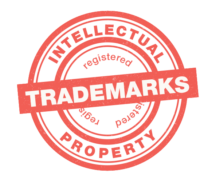 So long as a registrant has maintained use of the registered mark “in commerce” in association with the designated goods, the registration is insulated from attack based on claims of non-use or fraud. The fact that the registrant also uses the mark for goods that are not legal on the federal level is of no consequence to the registration. Thus, it is wise to include in the product lineup under the brand to be protected at least some good that meets the present requirements for federal trademark registration.
So long as a registrant has maintained use of the registered mark “in commerce” in association with the designated goods, the registration is insulated from attack based on claims of non-use or fraud. The fact that the registrant also uses the mark for goods that are not legal on the federal level is of no consequence to the registration. Thus, it is wise to include in the product lineup under the brand to be protected at least some good that meets the present requirements for federal trademark registration.
One option is to include a product where the only cannabis extract is from hemp seed oil. Without even testing it, you can be reasonably assured that such a product will contain little or no CBD or THC. Another option short of testing is to obtain a certification or warrant from your supplier that particular ingredients truly are hemp, i.e., have < 0.3% THC by dry weight. This could be relied on as evidence should no original product be available for testing to show that use was legitimate at the time registration was obtained. If you can’t obtain such a certification, testing the occasional sample and keeping records over time would also work. Product samples can now be tested for THC content for around $100 per sample, with results back in about a week.ii
Zone of Natural Expansion
Though non-hemp cannabis products cannot be covered directly by federal registrations, a federal registration for CBD/hemp products can have spillover benefits. This is because the scope of a registration may expand to cover things similar to what is designated. The question comes down to likelihood of confusion. Imagine a company holds a registration covering LOOVELA for “nutritional supplements containing hemp seed oil having no CBD and < 0.3% THC by dry weight.” It would be logical for a consumer to assume that non-hemp cannabis products sold under the LOOVELA mark would likely be made by the same company. Thus, provided the company actually sold products complying with its designation, it could assert the CBD-based registration to prevent sale of LOOVELA branded non-hemp cannabis products. Also, should such products be legalized federally, the company would likely be the only applicant able to obtain an additional federal registration for LOOVELA for use with them, because any competing attempt would be confused with their pre-existing registration for CBD/hemp products.
In conclusion, it should be noted that the law in this space is evolving rapidly and is nuanced. Every situation is unique in some way, and there are many reasons an application may fail or a registration may be attacked that are not addressed above. But there is value in obtaining a federal registration for your hemp brands, and there is an overall strategy to be employed for brand protection in the cannabis space.
The content above is based on information current at the time of its publication and may not reflect the most recent developments or guidance. Neal Gerber Eisenberg LLP provides this content for general informational purposes only. It does not constitute legal advice, and does not create an attorney-client relationship. You should seek advice from professional advisers with respect to your particular circumstances.
References
- See, e.g., Bonn-Miller, Marcel O., et al., “Labeling Accuracy of Cannabidiol Extracts Sold Online,” Journal of the American Medical Association, Vol. 318, No. 17, pp. 1708-09 (Nov. 7, 2017); Freedman, Daniel A. and Dr. Anup Patel, “Inadequate Regulation Contributes to Mislabeled Online Cannabidiol Products,” Pediatric Neurology Briefs, Vol. 32 at 3 (2018).
- See, e.g., www.botanacor.com/potency/

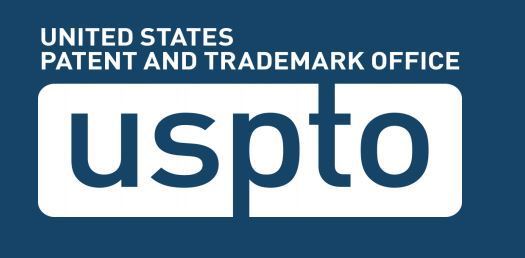



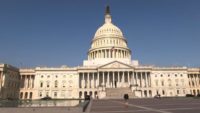

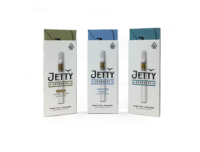
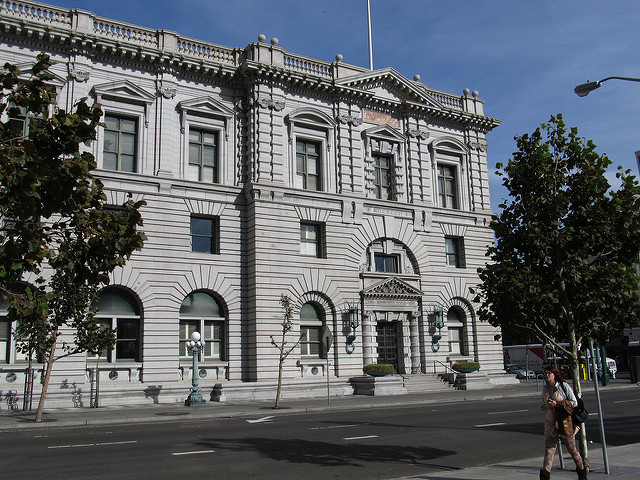

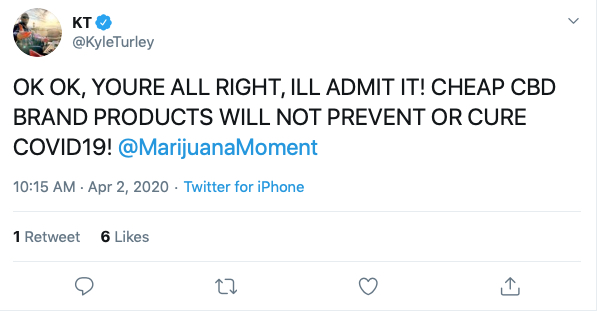





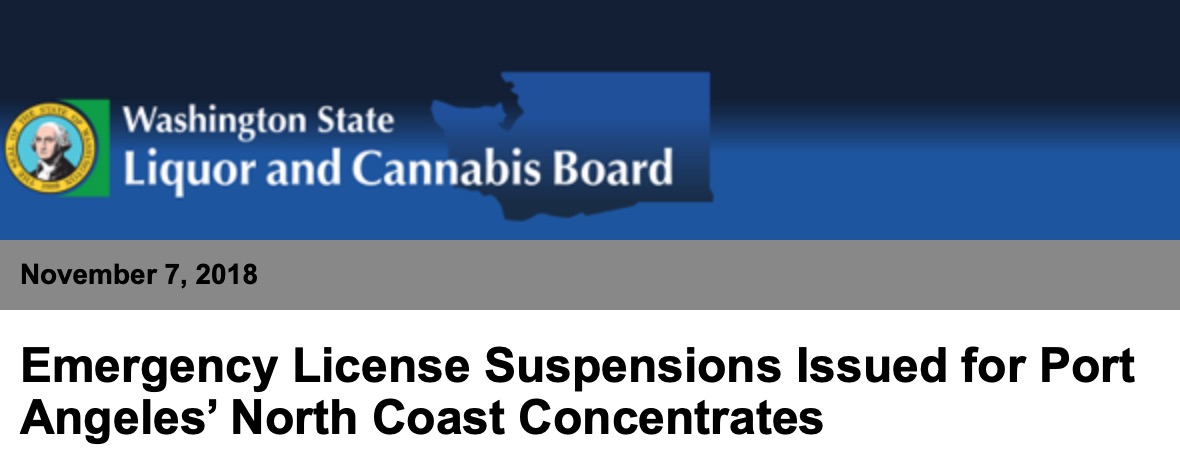

 According to a release emailed last week, the violation was uncovered during a routine traffic stop. “On September 20, 2018 an employee of North Coast Concentrates was pulled over by Lower Elwha Police, during the course of the traffic stop officers found 112 grams of traceable marijuana concentrates, three large jars and a large tote bin of untraced dried marijuana flower,” reads the release. “The products were not manifested in the state traceability system. Subsequent investigation by WSLCB officers revealed that the untraced product had been removed from the licensees grow operation and that the traced concentrates were returned from a marijuana retailer in Tacoma several weeks earlier.”
According to a release emailed last week, the violation was uncovered during a routine traffic stop. “On September 20, 2018 an employee of North Coast Concentrates was pulled over by Lower Elwha Police, during the course of the traffic stop officers found 112 grams of traceable marijuana concentrates, three large jars and a large tote bin of untraced dried marijuana flower,” reads the release. “The products were not manifested in the state traceability system. Subsequent investigation by WSLCB officers revealed that the untraced product had been removed from the licensees grow operation and that the traced concentrates were returned from a marijuana retailer in Tacoma several weeks earlier.”




